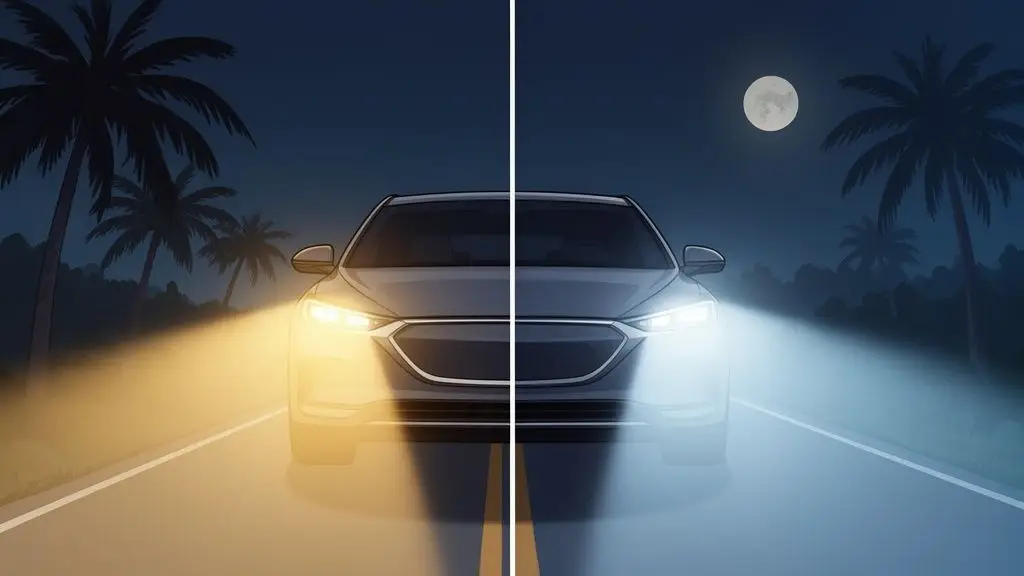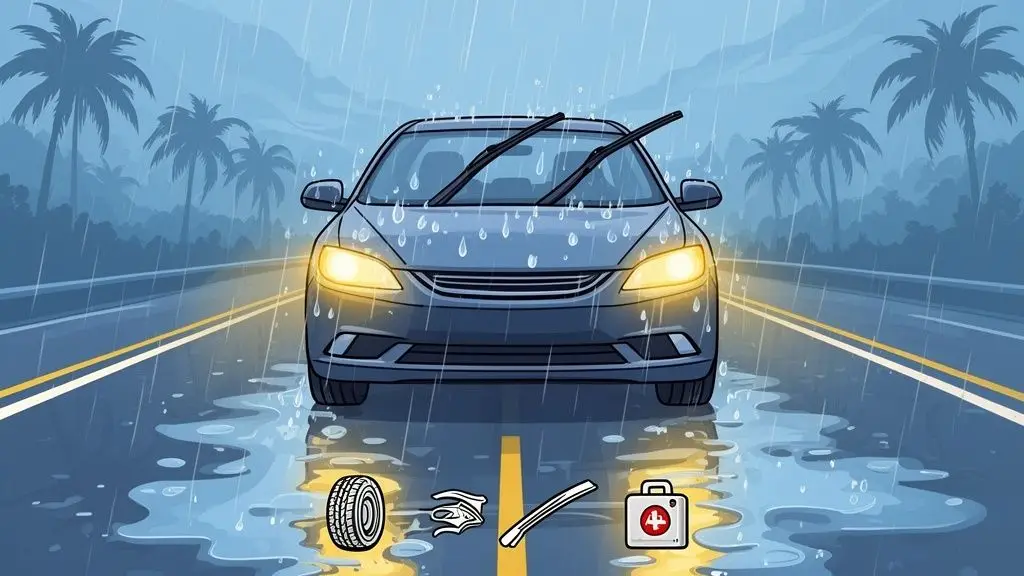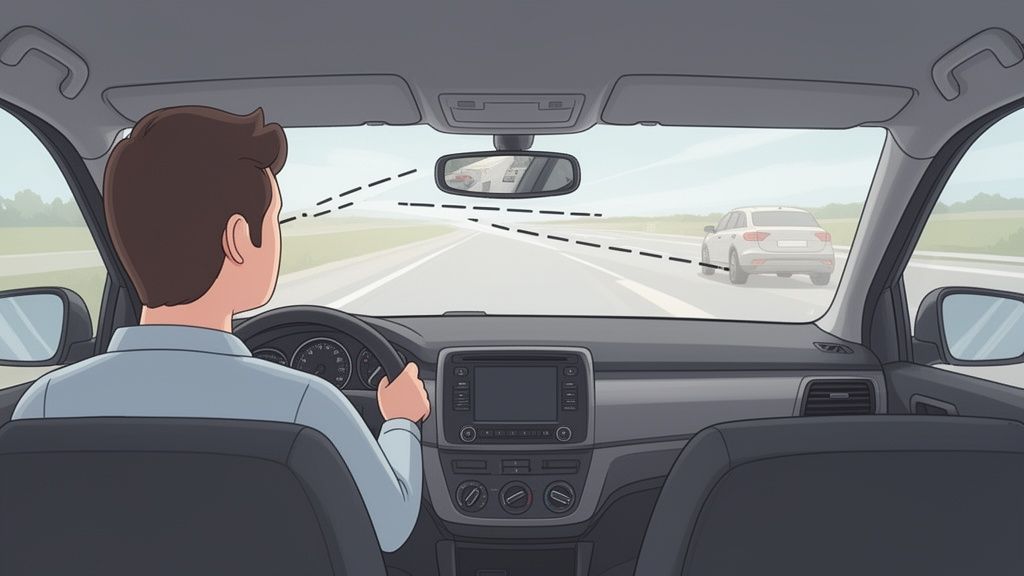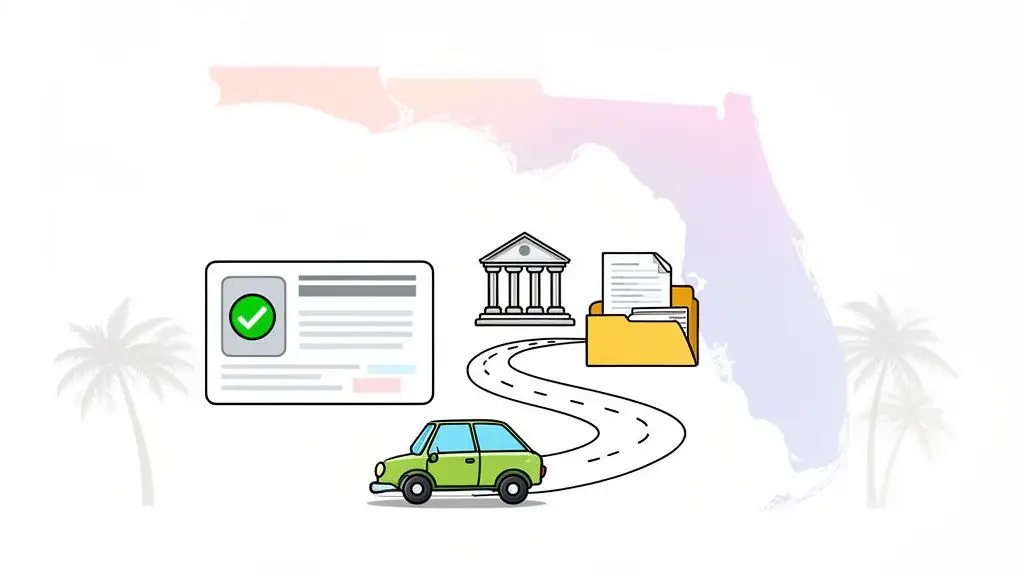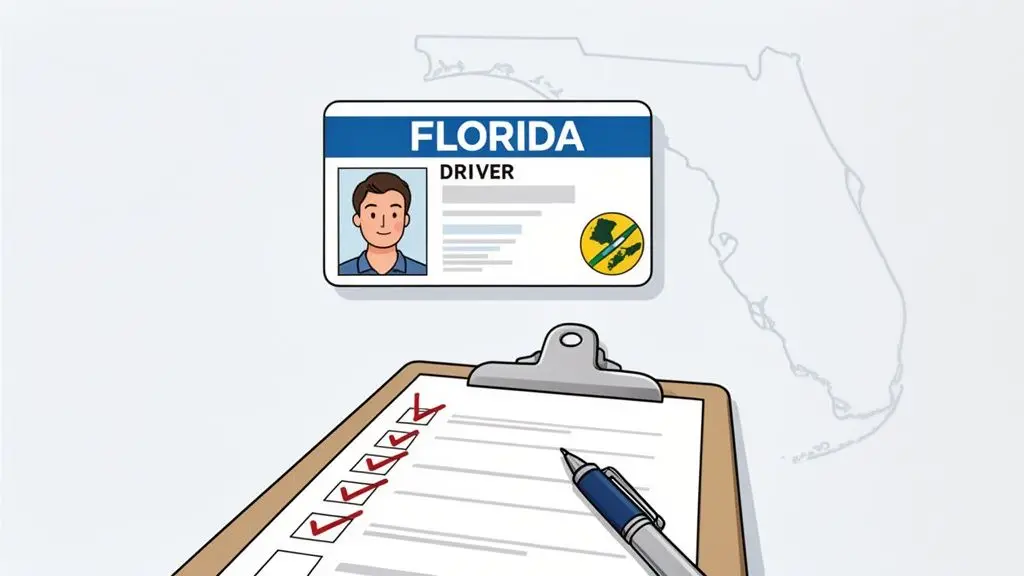Receiving a traffic ticket in Florida can feel overwhelming, but you have several traffic ticket options to consider before making a decision. Understanding each path is crucial. It helps protect your driving record and manage costs. In addition, it can keep your insurance rates from increasing. Your choice has long-term effects on your license and finances.
This guide will clarify your choices. As a result, you can act with confidence. We will break down seven different approaches you can take. These range from paying the fine to enrolling in a Florida approved traffic school. For example, a basic driver improvement course can be a smart choice. We will explore the pros and cons for each path.
Whether you contest the ticket or choose a Florida online traffic school, this article gives you the information you need. By exploring all your traffic ticket options, you can select the best strategy. This helps you handle your citation in the most effective way possible. Ultimately, we want to help you turn a stressful situation into a manageable one.
1. Pay the Fine (Pleading Guilty)
When you get a Florida traffic citation, the simplest choice is often to pay the fine. This action is an admission of guilt for the violation. For many drivers, this seems like the quickest way to move on. Consequently, this is one of the most common traffic ticket options people choose.
However, paying the fine has long-term consequences. In Florida, admitting guilt means the Florida Department of Highway Safety and Motor Vehicles (FLHSMV) will add points to your license. These points can lead to higher car insurance costs. If you get too many points, your license could be suspended. The FLHSMV provides official information on driver license suspensions.
When Paying the Fine Makes Sense
This option is often best for non-moving violations. For example, a parking ticket or a broken taillight usually do not add points. It might also be a choice for a minor moving violation if you are not eligible for traffic school. You should always check if the violation carries points before you pay.
Actionable Tips Before You Pay
Before you pay, consider these steps to make an informed decision:
- Verify the Fine Amount: First, double-check the citation for the correct fine. Most Florida counties have online sites where you can look up your ticket number.
- Understand the Deadline: Second, you usually have 30 days to pay the fine in Florida. Missing this deadline can cause late fees and license suspension.
- Keep Your Receipt: Third, always keep a copy of your payment confirmation. This is your proof that you resolved the matter.
- Consider Insurance Costs: Finally, remember that points can increase your insurance rates for years. The convenience of paying a ticket could cost you much more over time.
2. Contest the Ticket in Court (Pleading Not Guilty)
Another one of the common traffic ticket options is to challenge the citation. This means pleading “not guilty” and fighting the ticket in court. When you contest, you believe you are innocent or there were errors. For drivers with a strong defense, this option can avoid fines, points, and insurance hikes.
While fighting a ticket takes more effort, a win saves you from financial problems. Success depends on your evidence and understanding of the law. You can represent yourself or hire an attorney. If you win, the case is dismissed and no points are added to your record. For more information on legal processes, the U.S. Department of Justice offers resources on state court websites.
When Contesting the Ticket Makes Sense
This option is best when you have a strong, evidence-based argument. For example, you might question the calibration of a radar device for a speeding ticket. Similarly, you could dispute a ticket if you prove you were not driving. It’s also a good choice if the officer does not show up in court, which may lead to a dismissal.
Actionable Tips Before You Go to Court
Before you plead not guilty, careful preparation is key. Consider these steps:
- Gather All Evidence: First, take photos or videos of the scene and traffic signs if possible. Any evidence that supports your story is valuable.
- Request Discovery: Second, you can ask for the evidence the prosecution has. This includes the officer’s notes and dashcam footage.
- Prepare Your Questions: Third, prepare a clear list of questions for the officer. Focus on facts like their line of sight and weather conditions.
- Dress and Act Professionally: Finally, your appearance in court matters. Dress well, be respectful, and stay calm.
To fully understand the process, you can learn more about how to contest a traffic ticket in court.
3. Attend a Florida Approved Traffic School
Choosing a driver improvement course is one of the smartest traffic ticket options for many Florida drivers. It’s a great way to handle a citation. The most common option is the 4-Hour Basic Driver Improvement (BDI) course, also known as a basic driver course in Florida. This florida online traffic school helps you avoid points on your license for a moving violation. In turn, this prevents your insurance rates from increasing.
Another useful option is the 8-Hour Intermediate Driver Improvement (IDI) course. A judge may order you to take this course. It is for more serious violations or for drivers with a history of citations. Finally, there is the 12-Hour Advanced Driver Improvement (ADI) course. This is required for drivers whose licenses have been suspended or revoked. Taking the right my florida traffic school course is key to resolving your issue.
Different Courses for Different Needs
- 4-Hour Basic Driver Improvement (BDI): Ideal for avoiding points from a standard moving violation. This basic driver traffic school florida course is the most common choice.
- 8-Hour Intermediate Driver Improvement (IDI): Often court-ordered for more serious infractions.
- 12-Hour Advanced Driver Improvement (ADI): Required for drivers with suspended licenses or those labeled as a Habitual Traffic Offender (HTO).
Actionable Tips Before You Elect
Before you commit to a basic driver improvement course, make sure it is the right choice.
- Confirm Your Eligibility: Check your driving history with the FLHSMV. Ensure you have not used this option in the last 12 months. Also, check that you have not exceeded the five-time lifetime limit.
- Notify the Clerk of Court: You must tell the Clerk of Court you plan to take a course. This must be done within 30 days of getting the ticket.
- Choose a State-Approved Course: Only courses approved by the FLHSMV will count. The best Florida approved traffic schools offer convenient online options.
- Meet Your Deadlines: You will have a deadline to finish the course and submit your certificate. Failure to do so can lead to license suspension and more fees.
4. Hire a Traffic Attorney
For serious traffic violations, hiring a lawyer is one of the most effective traffic ticket options. A traffic attorney understands Florida’s laws and court procedures. Therefore, their expertise can lead to much better outcomes than representing yourself.
A legal professional acts as your advocate. They can find weaknesses in the case against you. They can also challenge evidence or negotiate a plea bargain. For many, the cost of an attorney is a good investment. It can save you from the long-term costs of points, fines, and higher insurance rates. To understand road safety regulations better, you can visit the Federal Highway Administration’s safety page.
When Hiring an Attorney Makes Sense
This option is smart for complex citations. For instance, consider hiring an attorney if you face a potential license suspension. It is also highly recommended for commercial drivers, as their jobs depend on a clean record. Furthermore, if you face multiple violations or a criminal traffic offense, legal help is essential.
Actionable Tips Before You Hire
Before you hire a lawyer, it’s important to find the right person for your case.
- Verify Traffic Law Specialization: First, make sure the attorney focuses on traffic defense. A general lawyer may not have the needed expertise.
- Ask About Local Experience: Second, an attorney familiar with the local court will know the judges and prosecutors.
- Clarify the Fee Structure: Third, ask if they charge a flat fee or bill by the hour. Get a clear cost estimate in writing.
- Discuss Realistic Outcomes: Finally, a good attorney will give you a realistic assessment of your case and possible results.
5. Deferred Adjudication/Deferred Disposition
Another one of the traffic ticket options is deferred adjudication. This is a middle ground between fighting a ticket and pleading guilty. You plead “no contest,” and the court postpones a formal judgment. If you meet certain conditions, the ticket is eventually dismissed.
This option is appealing because the violation does not go on your driving record. As a result, no points are added to your license. It helps you keep your record clean without the risk of a trial. However, if you fail to meet the conditions, the original plea is entered with all its penalties. The U.S. Department of Transportation offers great resources on roadway safety for all drivers.
When Deferred Adjudication Makes Sense
Deferred adjudication is often a great choice for drivers with a clean record who got a minor ticket. For instance, it allows a good driver who made one mistake to avoid long-term issues like higher insurance costs. It is usually not available for serious offenses or for commercial drivers.
Actionable Tips Before You Request a Deferral
Before choosing this path, review the requirements carefully.
- Verify Your Eligibility: First, not all drivers or violations qualify. Check with the court to see if this is an option for you.
- Understand All Conditions: Second, the court will set conditions. These may include a probation period and completing a defensive driving course.
- Track Your Probation Period: Third, mark the end date of your probation on your calendar. It is your job to drive safely during this time.
- Keep Your Completion Documents: Finally, after you finish, the court will dismiss your case. Always keep a copy of the dismissal order as proof.
6. Plea Bargaining/Negotiated Settlement
For some traffic violations, you might be able to negotiate with the prosecutor. This process is called plea bargaining. It involves agreeing to reduce the original charge to a lesser one. The goal is to get a better outcome, like fewer points or a lower fine. Consequently, this is one of the more strategic traffic ticket options.
This infographic shows a simple process to help you see if negotiation is a good path for you.
The flowchart shows that your driving history and the violation’s severity are key factors. For example, negotiating a lesser charge like careless driving instead of reckless driving can greatly help your record. It also has a big impact on your insurance rates.
When Plea Bargaining Makes Sense
This option is most effective for serious violations where penalties are harsh. For example, this includes reckless driving or speeding 30+ mph over the limit. It can also be a good choice if you have a clean driving record. Successful talks often result in charges being reduced to a non-moving violation, which usually has no points.
Actionable Tips Before You Negotiate
Before you try to negotiate, you must prepare to get the best result.
- Research Common Outcomes: First, look into what plea deals are common for your violation in your Florida county. This gives you a realistic goal.
- Present Mitigating Factors: Second, gather any evidence that could help you. A clean record or proof of an emergency can be strong tools.
- Consider Legal Counsel: Third, for serious charges, hiring a traffic attorney is a good idea. They know how to negotiate with prosecutors. For more insights, you can learn about preparing for court and other traffic court advice on bdischool.com.
- Understand the Agreement: Finally, if an offer is made, understand all the terms before you agree. This includes the fine, required courses, and points.
7. Ignore the Ticket (Not Recommended)
Of all the traffic ticket options, ignoring the citation is the worst one. This means not responding to the ticket within the required time, which is usually 30 days in Florida. This is not a passive choice. It is an automatic admission of guilt that leads to severe penalties. It offers no benefits and guarantees bad results.
When a driver ignores a ticket, the court enters a default judgment. This results in maximum points on their license. The state can also suspend their driving privileges. Furthermore, the small fine will grow with late fees. In some cases, a judge may even issue a warrant for your arrest.
When Ignoring the Ticket Occurs
This “option” is never a strategy but a serious mistake. It happens when someone loses the ticket, forgets the deadline, or thinks the problem will go away. For example, an unpaid ticket can lead to a surprise license suspension. This could result in an arrest during a future traffic stop.
Actionable Tips If You’ve Ignored a Ticket
If you have already missed the deadline, you must act right away. Doing nothing will only make it worse.
- Contact the Court Immediately: Do not wait. Call the Clerk of Court in the county where you got the ticket. Explain what happened and ask how to fix it.
- Address Old Tickets: Check your driving record with the FLHSMV for any old tickets. Taking care of them can prevent sudden problems.
- Request a Payment Plan: If you cannot afford the fines, ask the court about a payment plan. Many places offer this to help people pay their debts.
- Never Assume It Will Go Away: Traffic tickets do not expire. They will eventually catch up with you. Always take action.
Traffic Ticket Options Comparison
| Option | Implementation Complexity 🔄 | Resource Requirements ⚡ | Expected Outcomes 📊 | Ideal Use Cases 💡 | Key Advantages ⭐ |
|---|---|---|---|---|---|
| Pay the Fine (Pleading Guilty) | Very low – no court appearance needed | Minimal – payment via online/mail/phone | Guilty verdict, points added, fine paid | Minor violations where cost/time of fight outweighs fine | Fast resolution, no court time, certain cost |
| Contest the Ticket in Court | High – requires trial, preparation, appearances | Moderate to high – time, possible legal aid | Possible dismissal or reduced charges; risk of conviction | Disputing validity of ticket or errors in citation | Potential full dismissal, avoid points, preserve clean record |
| Florida Approved Traffic School | Moderate – course completion required | Time commitment (4-12 hours), course fee | No points for BDI, possible insurance discounts | Minor moving violations, first-time offenders | Avoid points, improve driving knowledge, insurance benefits |
| Hire a Traffic Attorney | High – legal consultation, court appearances | High – attorney fees and time | Higher chance of dismissal or plea bargain | Serious violations, CDL holders, complex cases | Expert representation, better outcomes, fewer appearances |
| Deferred Adjudication/Disposition | Moderate – compliance with court terms | Low to moderate – court costs | Case dismissed if conditions met, no points added | Eligible minor violations, first-time offenders | Avoid conviction/points, maintain clean record, no trial |
| Plea Bargaining/Negotiated | Moderate to high – negotiation process | Moderate – possible attorney involvement | Reduced charges/penalties, fewer points | Cases with strong mitigation factors, clean records | Reduced penalties, faster than trial, fewer points |
| Ignore the Ticket (Not Recommended) | None – no action taken | None initially | Automatic conviction, escalating penalties | None – generally risky and costly | None – leads to worst outcomes |
Making the Smartest Choice for Your Driving Future
Receiving a traffic ticket in Florida can be stressful. However, it’s important to remember that you have several traffic ticket options. Each path has its own results and benefits. This guide has detailed the main choices available. As a result, you can move past the stress and make a clear decision.
The easiest route, paying the fine, is often not the best. While it is quick, it is an admission of guilt. This means points on your driving record. Over time, these points can lead to higher insurance premiums and even license suspension. Before you pay, you must understand the full picture. Beyond the fines, consider the long-term impact on the cost of your insurance for your car. Making a smart choice now can save you money and trouble later.
Key Takeaways for Your Decision
To make the best choice, keep these key ideas in mind:
- Evaluate the Long-Term Impact: First, don’t just focus on the fine. Think about how points will affect your insurance rates and driving privileges for years.
- Know Your Eligibility: Second, options like a basic driver improvement course are not available for every violation. Before you choose, confirm you are eligible with the county clerk. This simple step saves time.
- Time is a Critical Factor: Finally, Florida law gives you a strict 30-day window to respond. Ignoring the ticket leads to severe penalties, like a suspended license. Act fast to keep all your options open.
The goal is to resolve the ticket while protecting your record and saving money. For many drivers, completing a state-approved basic driver course in Florida offers the best result. It prevents points and stops your insurance rates from rising. It is also a good refresher on safe driving. By carefully weighing all the traffic ticket options discussed, you can turn a bad situation into a positive step toward being a safer driver.
Ready to protect your driving record and keep your insurance rates down? BDISchool offers convenient, state-approved online courses like the Basic Driver Improvement course to help you meet court requirements easily. Enroll in a course today and take the smartest step toward resolving your Florida traffic ticket.
